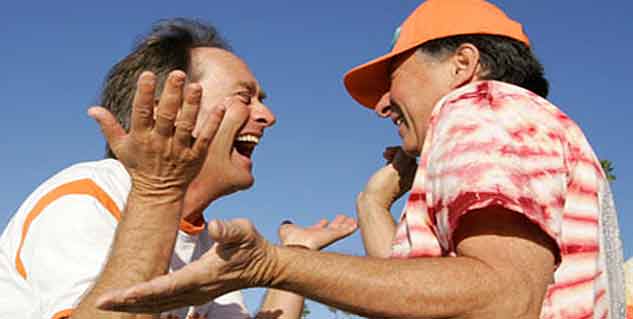Incorporating laughter into a physical activity program could improve older adults’ mental health, aerobic endurance and confidence in their ability to exercise.
In this Georgia State University study, older adults residing in four assisted-living facilities participated in a moderate-intensity group exercise program called LaughActive that incorporates playful simulated laughter into a strength, balance and flexibility workout. In simulated laughter exercises, participants initially choose to laugh and go through the motions of laughing. The exercises facilitate eye contact and playful behaviors with other participants, which generally transition the laughter from simulated to genuine. It is kind of like Laughter Yoga.
For six weeks, study participants attended two 45-minute physical activity sessions per week that included eight to 10 laughter exercises lasting 30 to 60 seconds each.
When surveyed about their satisfaction with the program, 96.2 percent found laughter to be an enjoyable addition to a traditional exercise program, 88.9 percent said laughter helped make exercise more accessible and 88.9 percent reported the program enhanced their motivation to participate in other exercise classes or activities.
Despite the health benefits of physical activity and the risks of physical inactivity, many adults (1 in 4) don’t engage in sufficient physical activity to achieve health benefits.
The pleasant associations with laughter may add enjoyment to an exercise program and keep older adults motivated to work out.
“The combination of laughter and exercise may influence older adults to begin exercising and to stick with the program,” said Celeste Greene, lead author of the study and a master’s degree graduate from Georgia State’s Gerontology Institute. “We want to help older adults have a positive experience with exercise, so we developed a physical activity program that specifically targets exercise enjoyment through laughter. Laughter is an enjoyable activity and it carries with it so many health benefits, so we incorporated intentional laughter into this program to put the fun in fitness for older adults.”
This research is one of few studies to evaluate the potential of simulated laughter in improving health outcomes among older adults, and it’s the first evaluation of a dedicated physical activity program that incorporated simulated laughter, said Dr. Jennifer Craft Morgan, second author of the study and Greene’s thesis adviser.
Co-authors of the study include Dr. Chivon Mingo of the Gerontology Institute at Georgia State and Dr. LaVona Traywick of the Cooperative Extension Service at the University of Arkansas.
Read the study at http://gerontologist.oxfordjournals.org/content/early/2016/08/03/geront.gnw105.full?sid=3b88def6-8841-49f3-a4e2-faec3c48392e.
To learn more about the LaughActive program, visit www.laughactive.com.

